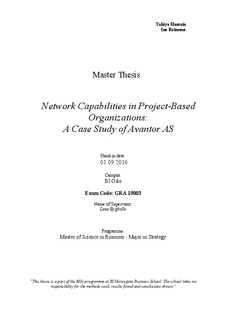Network Capabilities in Project-Based Organizations ; A Case Study of Avantor AS
Master thesis
Permanent lenke
http://hdl.handle.net/11250/2443680Utgivelsesdato
2016Metadata
Vis full innførselSamlinger
- Master of Science [1621]
Sammendrag
The objectives of this thesis are to highlight the important elements and factors for
creating and sustaining network capabilities in project-based organizations. A
network capability is a firm’s ability to handle the relationships they are
embedded in. The purpose is to provide new insight to the existing theory in an
attempt to develop theory on network capabilities within the established literature
on the topic. Firm’s increased level on engaging in different inter-organizational
networks to handle project complexity has encouraged this study. Organizations’
strategizing to create and sustain network capabilities may serve as a core
competence for the firm to achieve project success. This thesis designed a single
case study on the firm Avantor AS undertaking multiple projects within city
development at the Nydalen area in Oslo and is used to collect the data from the
empirical world. Moreover, the re-location of BI Norwegian Business School to
the Nydalen area will be used as an example to illustrate Avantor AS’s main
activities when undertaking a project in a network setting. Built on qualitative
research, mainly semi-structured interviews of knowledgeable individuals from
both Avantor AS and BI Norwegian Business School, this thesis aims to raise
issues on the creation and sustainability of network capabilities that have not been captured by previous studies.
A summarized theoretical framework was used as a base to guide this thesis and
illustrated that network capabilities are developed in projects through a process
involving three stages: Establish relationships, maintain relationships and learn
from relationships. The base of capabilities already maintained at the
organizational level feed these stages, and the outcome of the process is the
creation of network capabilities. Network capabilities further feed back to both the
project level and the organizational level for further improvement, making it an
iterative process. This thesis has found that the visioning ability, reputation
building, innovation and flexibility used in project-based organizations all
impacted a firm’s ability to create and sustain network capabilities. In line with
this, confidence in network seemed to be the most edge able when selecting
partners, increasing the chances of innovation including new partners to the
network. Sustaining network capabilities is derived from the dynamic capabilities.
Hence, the ability to adjust according to requirements for a complex product and
making the new skills acquired useful in different relations on the next project.
Beskrivelse
Masteroppgave(MSc) in Master of Science in Business, Strategy - Handelshøyskolen BI, 2016
